Analyzing Ethical Issues in a Mental Health Nursing Case Study
VerifiedAdded on 2023/06/13
|8
|1958
|170
Case Study
AI Summary
This case study delves into the ethical dilemmas presented in a scenario involving Amos, a high school student denied treatment during a cholera outbreak due to his living situation. The analysis identifies biased care as a significant ethical issue, violating the principles of justice, beneficence, and non-maleficence. It further examines breaches of human rights, professional codes of conduct, and nursing practice standards. The paper recommends prioritizing patient needs based on the severity of their condition and providing primary care to prevent further deterioration, even with limited resources. The conclusion emphasizes the importance of ethical considerations in healthcare and the need for equitable and non-discriminatory practices to ensure patient well-being and prevent avoidable harm. The solution refers to Australian charter of healthcare rights and Code of Ethics for Nurses in Australia.
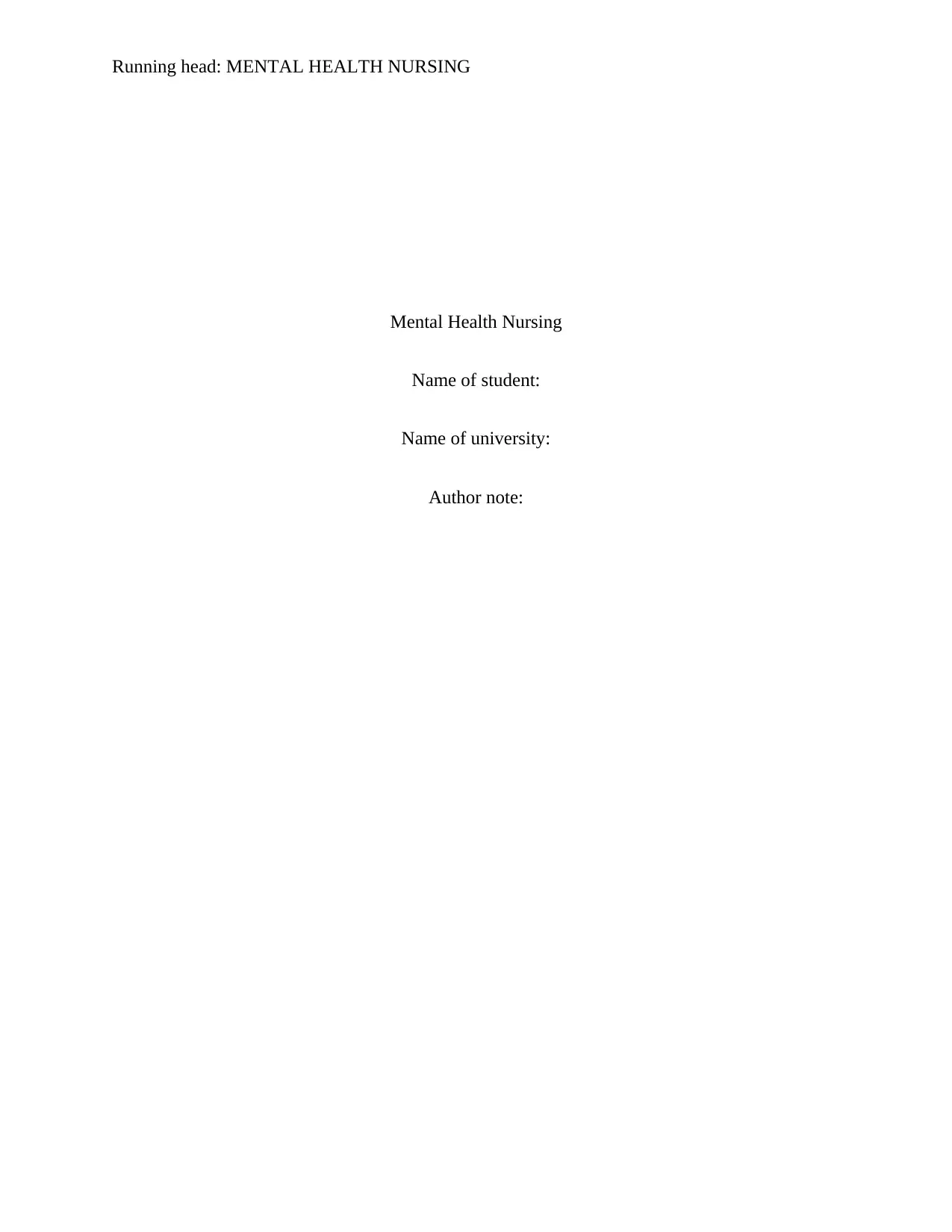
Running head: MENTAL HEALTH NURSING
Mental Health Nursing
Name of student:
Name of university:
Author note:
Mental Health Nursing
Name of student:
Name of university:
Author note:
Paraphrase This Document
Need a fresh take? Get an instant paraphrase of this document with our AI Paraphraser
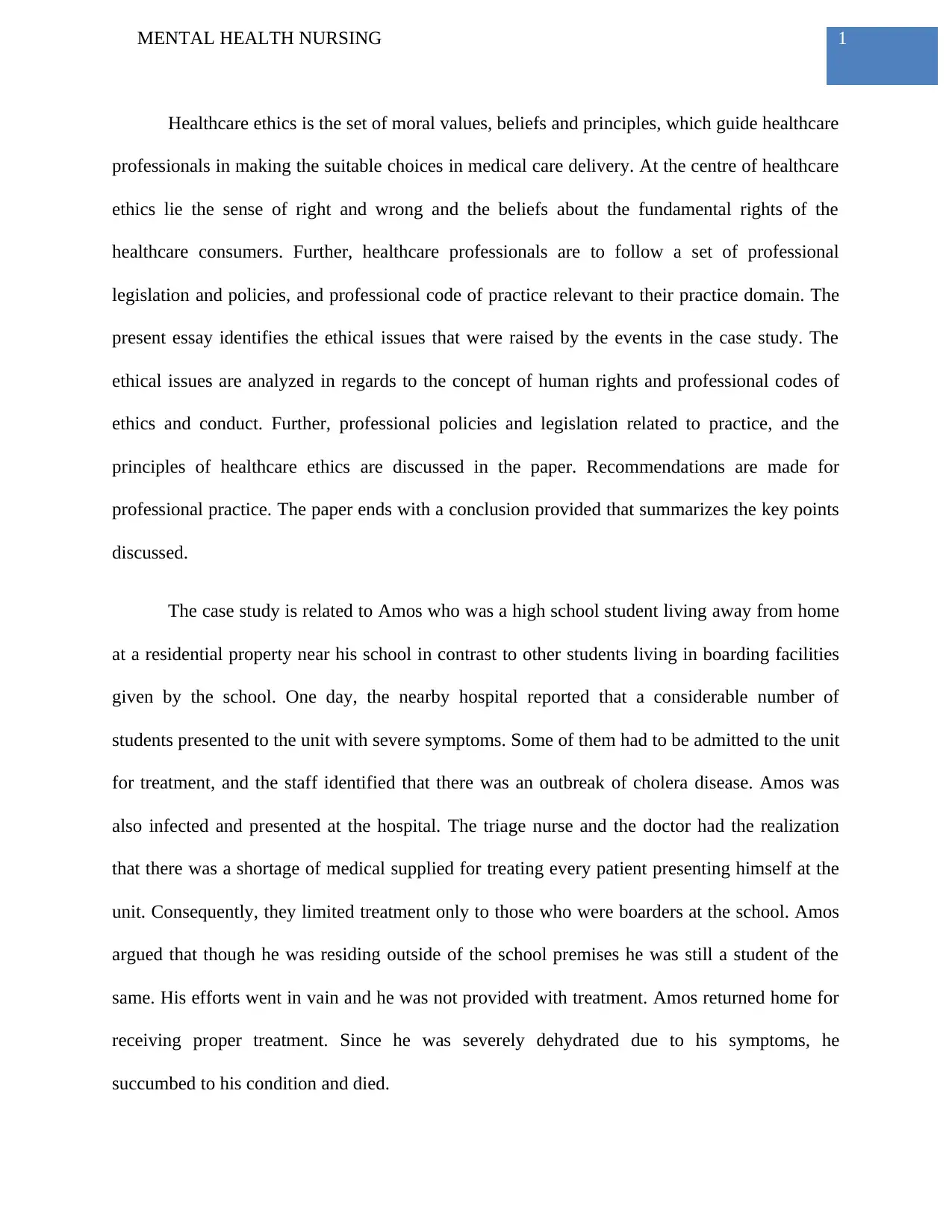
1MENTAL HEALTH NURSING
Healthcare ethics is the set of moral values, beliefs and principles, which guide healthcare
professionals in making the suitable choices in medical care delivery. At the centre of healthcare
ethics lie the sense of right and wrong and the beliefs about the fundamental rights of the
healthcare consumers. Further, healthcare professionals are to follow a set of professional
legislation and policies, and professional code of practice relevant to their practice domain. The
present essay identifies the ethical issues that were raised by the events in the case study. The
ethical issues are analyzed in regards to the concept of human rights and professional codes of
ethics and conduct. Further, professional policies and legislation related to practice, and the
principles of healthcare ethics are discussed in the paper. Recommendations are made for
professional practice. The paper ends with a conclusion provided that summarizes the key points
discussed.
The case study is related to Amos who was a high school student living away from home
at a residential property near his school in contrast to other students living in boarding facilities
given by the school. One day, the nearby hospital reported that a considerable number of
students presented to the unit with severe symptoms. Some of them had to be admitted to the unit
for treatment, and the staff identified that there was an outbreak of cholera disease. Amos was
also infected and presented at the hospital. The triage nurse and the doctor had the realization
that there was a shortage of medical supplied for treating every patient presenting himself at the
unit. Consequently, they limited treatment only to those who were boarders at the school. Amos
argued that though he was residing outside of the school premises he was still a student of the
same. His efforts went in vain and he was not provided with treatment. Amos returned home for
receiving proper treatment. Since he was severely dehydrated due to his symptoms, he
succumbed to his condition and died.
Healthcare ethics is the set of moral values, beliefs and principles, which guide healthcare
professionals in making the suitable choices in medical care delivery. At the centre of healthcare
ethics lie the sense of right and wrong and the beliefs about the fundamental rights of the
healthcare consumers. Further, healthcare professionals are to follow a set of professional
legislation and policies, and professional code of practice relevant to their practice domain. The
present essay identifies the ethical issues that were raised by the events in the case study. The
ethical issues are analyzed in regards to the concept of human rights and professional codes of
ethics and conduct. Further, professional policies and legislation related to practice, and the
principles of healthcare ethics are discussed in the paper. Recommendations are made for
professional practice. The paper ends with a conclusion provided that summarizes the key points
discussed.
The case study is related to Amos who was a high school student living away from home
at a residential property near his school in contrast to other students living in boarding facilities
given by the school. One day, the nearby hospital reported that a considerable number of
students presented to the unit with severe symptoms. Some of them had to be admitted to the unit
for treatment, and the staff identified that there was an outbreak of cholera disease. Amos was
also infected and presented at the hospital. The triage nurse and the doctor had the realization
that there was a shortage of medical supplied for treating every patient presenting himself at the
unit. Consequently, they limited treatment only to those who were boarders at the school. Amos
argued that though he was residing outside of the school premises he was still a student of the
same. His efforts went in vain and he was not provided with treatment. Amos returned home for
receiving proper treatment. Since he was severely dehydrated due to his symptoms, he
succumbed to his condition and died.
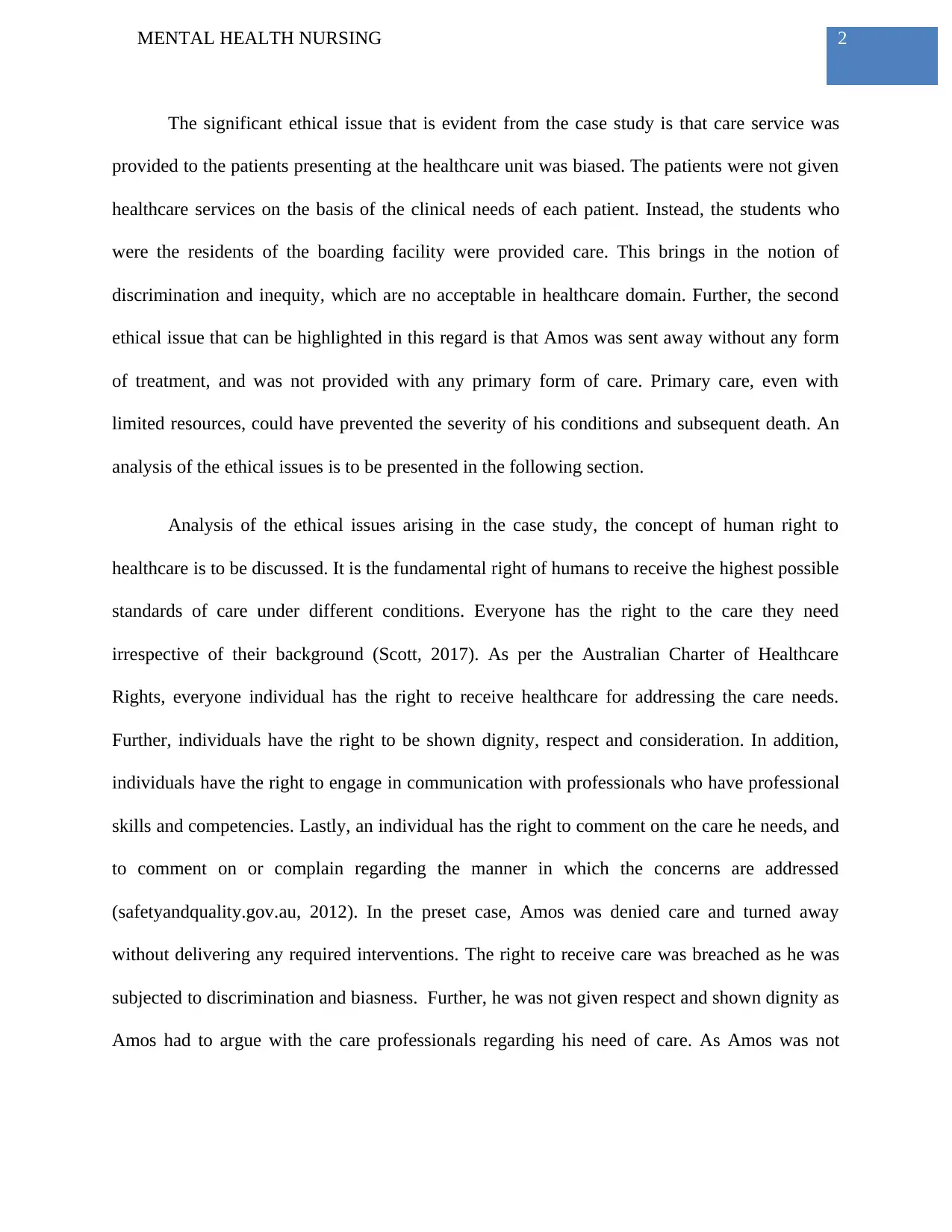
2MENTAL HEALTH NURSING
The significant ethical issue that is evident from the case study is that care service was
provided to the patients presenting at the healthcare unit was biased. The patients were not given
healthcare services on the basis of the clinical needs of each patient. Instead, the students who
were the residents of the boarding facility were provided care. This brings in the notion of
discrimination and inequity, which are no acceptable in healthcare domain. Further, the second
ethical issue that can be highlighted in this regard is that Amos was sent away without any form
of treatment, and was not provided with any primary form of care. Primary care, even with
limited resources, could have prevented the severity of his conditions and subsequent death. An
analysis of the ethical issues is to be presented in the following section.
Analysis of the ethical issues arising in the case study, the concept of human right to
healthcare is to be discussed. It is the fundamental right of humans to receive the highest possible
standards of care under different conditions. Everyone has the right to the care they need
irrespective of their background (Scott, 2017). As per the Australian Charter of Healthcare
Rights, everyone individual has the right to receive healthcare for addressing the care needs.
Further, individuals have the right to be shown dignity, respect and consideration. In addition,
individuals have the right to engage in communication with professionals who have professional
skills and competencies. Lastly, an individual has the right to comment on the care he needs, and
to comment on or complain regarding the manner in which the concerns are addressed
(safetyandquality.gov.au, 2012). In the preset case, Amos was denied care and turned away
without delivering any required interventions. The right to receive care was breached as he was
subjected to discrimination and biasness. Further, he was not given respect and shown dignity as
Amos had to argue with the care professionals regarding his need of care. As Amos was not
The significant ethical issue that is evident from the case study is that care service was
provided to the patients presenting at the healthcare unit was biased. The patients were not given
healthcare services on the basis of the clinical needs of each patient. Instead, the students who
were the residents of the boarding facility were provided care. This brings in the notion of
discrimination and inequity, which are no acceptable in healthcare domain. Further, the second
ethical issue that can be highlighted in this regard is that Amos was sent away without any form
of treatment, and was not provided with any primary form of care. Primary care, even with
limited resources, could have prevented the severity of his conditions and subsequent death. An
analysis of the ethical issues is to be presented in the following section.
Analysis of the ethical issues arising in the case study, the concept of human right to
healthcare is to be discussed. It is the fundamental right of humans to receive the highest possible
standards of care under different conditions. Everyone has the right to the care they need
irrespective of their background (Scott, 2017). As per the Australian Charter of Healthcare
Rights, everyone individual has the right to receive healthcare for addressing the care needs.
Further, individuals have the right to be shown dignity, respect and consideration. In addition,
individuals have the right to engage in communication with professionals who have professional
skills and competencies. Lastly, an individual has the right to comment on the care he needs, and
to comment on or complain regarding the manner in which the concerns are addressed
(safetyandquality.gov.au, 2012). In the preset case, Amos was denied care and turned away
without delivering any required interventions. The right to receive care was breached as he was
subjected to discrimination and biasness. Further, he was not given respect and shown dignity as
Amos had to argue with the care professionals regarding his need of care. As Amos was not
⊘ This is a preview!⊘
Do you want full access?
Subscribe today to unlock all pages.

Trusted by 1+ million students worldwide
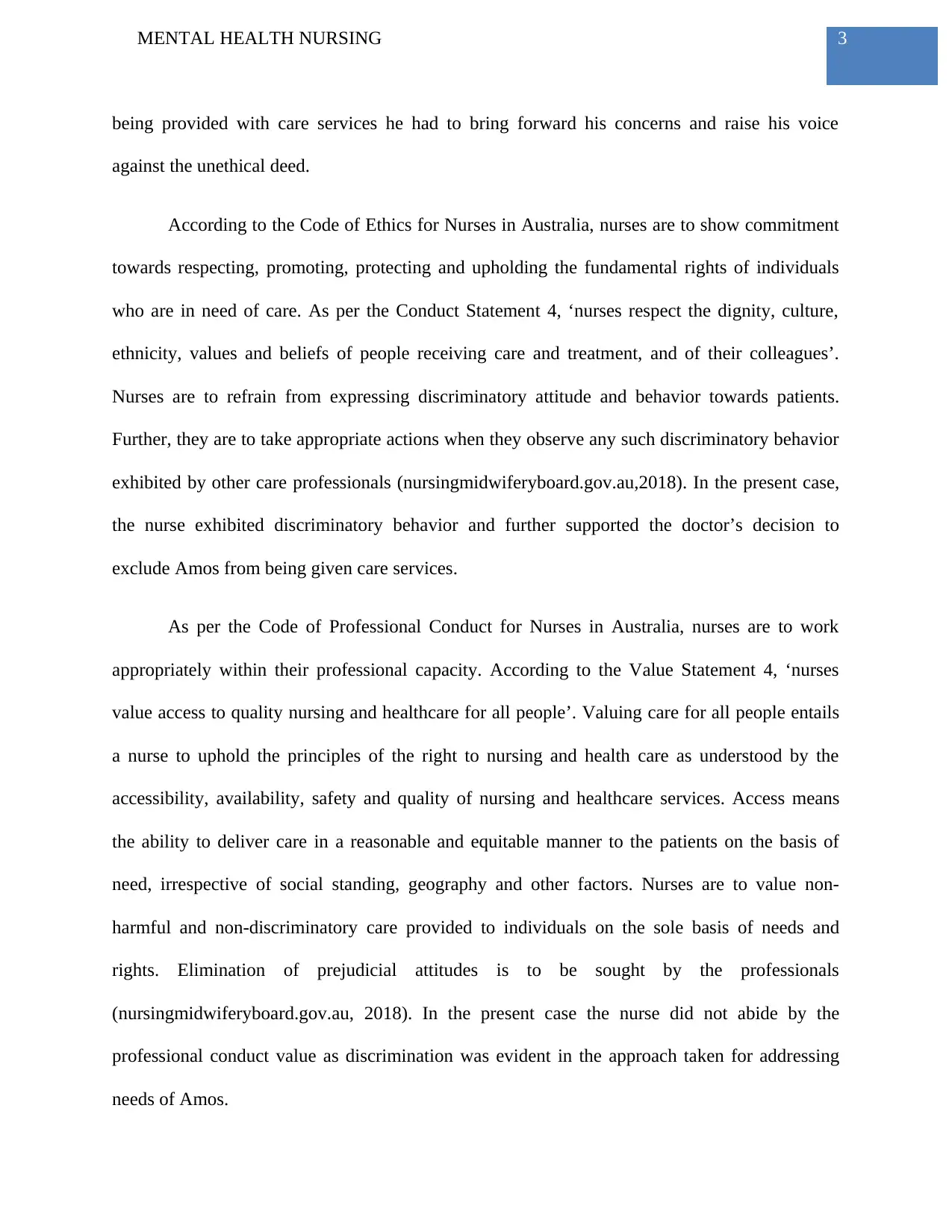
3MENTAL HEALTH NURSING
being provided with care services he had to bring forward his concerns and raise his voice
against the unethical deed.
According to the Code of Ethics for Nurses in Australia, nurses are to show commitment
towards respecting, promoting, protecting and upholding the fundamental rights of individuals
who are in need of care. As per the Conduct Statement 4, ‘nurses respect the dignity, culture,
ethnicity, values and beliefs of people receiving care and treatment, and of their colleagues’.
Nurses are to refrain from expressing discriminatory attitude and behavior towards patients.
Further, they are to take appropriate actions when they observe any such discriminatory behavior
exhibited by other care professionals (nursingmidwiferyboard.gov.au,2018). In the present case,
the nurse exhibited discriminatory behavior and further supported the doctor’s decision to
exclude Amos from being given care services.
As per the Code of Professional Conduct for Nurses in Australia, nurses are to work
appropriately within their professional capacity. According to the Value Statement 4, ‘nurses
value access to quality nursing and healthcare for all people’. Valuing care for all people entails
a nurse to uphold the principles of the right to nursing and health care as understood by the
accessibility, availability, safety and quality of nursing and healthcare services. Access means
the ability to deliver care in a reasonable and equitable manner to the patients on the basis of
need, irrespective of social standing, geography and other factors. Nurses are to value non-
harmful and non-discriminatory care provided to individuals on the sole basis of needs and
rights. Elimination of prejudicial attitudes is to be sought by the professionals
(nursingmidwiferyboard.gov.au, 2018). In the present case the nurse did not abide by the
professional conduct value as discrimination was evident in the approach taken for addressing
needs of Amos.
being provided with care services he had to bring forward his concerns and raise his voice
against the unethical deed.
According to the Code of Ethics for Nurses in Australia, nurses are to show commitment
towards respecting, promoting, protecting and upholding the fundamental rights of individuals
who are in need of care. As per the Conduct Statement 4, ‘nurses respect the dignity, culture,
ethnicity, values and beliefs of people receiving care and treatment, and of their colleagues’.
Nurses are to refrain from expressing discriminatory attitude and behavior towards patients.
Further, they are to take appropriate actions when they observe any such discriminatory behavior
exhibited by other care professionals (nursingmidwiferyboard.gov.au,2018). In the present case,
the nurse exhibited discriminatory behavior and further supported the doctor’s decision to
exclude Amos from being given care services.
As per the Code of Professional Conduct for Nurses in Australia, nurses are to work
appropriately within their professional capacity. According to the Value Statement 4, ‘nurses
value access to quality nursing and healthcare for all people’. Valuing care for all people entails
a nurse to uphold the principles of the right to nursing and health care as understood by the
accessibility, availability, safety and quality of nursing and healthcare services. Access means
the ability to deliver care in a reasonable and equitable manner to the patients on the basis of
need, irrespective of social standing, geography and other factors. Nurses are to value non-
harmful and non-discriminatory care provided to individuals on the sole basis of needs and
rights. Elimination of prejudicial attitudes is to be sought by the professionals
(nursingmidwiferyboard.gov.au, 2018). In the present case the nurse did not abide by the
professional conduct value as discrimination was evident in the approach taken for addressing
needs of Amos.
Paraphrase This Document
Need a fresh take? Get an instant paraphrase of this document with our AI Paraphraser
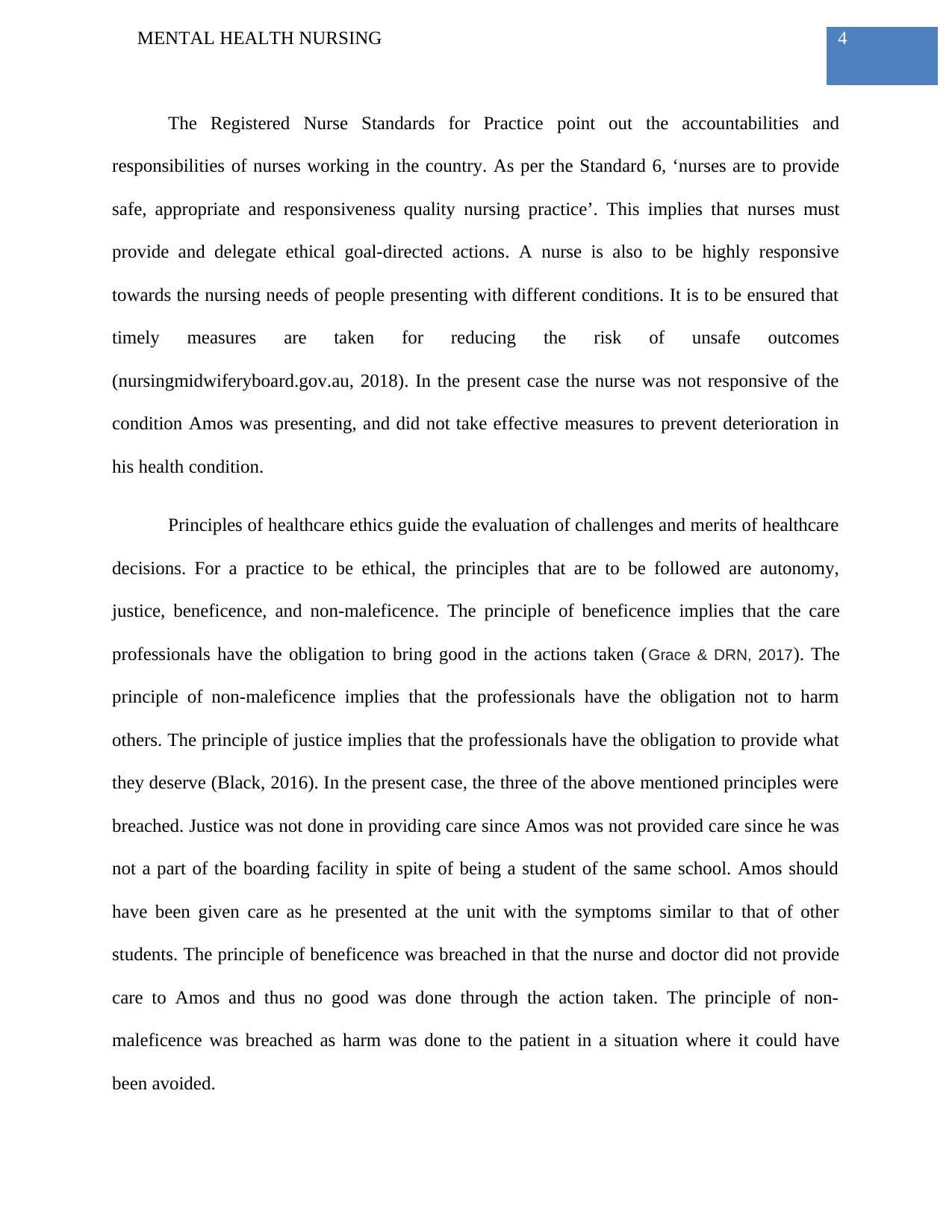
4MENTAL HEALTH NURSING
The Registered Nurse Standards for Practice point out the accountabilities and
responsibilities of nurses working in the country. As per the Standard 6, ‘nurses are to provide
safe, appropriate and responsiveness quality nursing practice’. This implies that nurses must
provide and delegate ethical goal-directed actions. A nurse is also to be highly responsive
towards the nursing needs of people presenting with different conditions. It is to be ensured that
timely measures are taken for reducing the risk of unsafe outcomes
(nursingmidwiferyboard.gov.au, 2018). In the present case the nurse was not responsive of the
condition Amos was presenting, and did not take effective measures to prevent deterioration in
his health condition.
Principles of healthcare ethics guide the evaluation of challenges and merits of healthcare
decisions. For a practice to be ethical, the principles that are to be followed are autonomy,
justice, beneficence, and non-maleficence. The principle of beneficence implies that the care
professionals have the obligation to bring good in the actions taken (Grace & DRN, 2017). The
principle of non-maleficence implies that the professionals have the obligation not to harm
others. The principle of justice implies that the professionals have the obligation to provide what
they deserve (Black, 2016). In the present case, the three of the above mentioned principles were
breached. Justice was not done in providing care since Amos was not provided care since he was
not a part of the boarding facility in spite of being a student of the same school. Amos should
have been given care as he presented at the unit with the symptoms similar to that of other
students. The principle of beneficence was breached in that the nurse and doctor did not provide
care to Amos and thus no good was done through the action taken. The principle of non-
maleficence was breached as harm was done to the patient in a situation where it could have
been avoided.
The Registered Nurse Standards for Practice point out the accountabilities and
responsibilities of nurses working in the country. As per the Standard 6, ‘nurses are to provide
safe, appropriate and responsiveness quality nursing practice’. This implies that nurses must
provide and delegate ethical goal-directed actions. A nurse is also to be highly responsive
towards the nursing needs of people presenting with different conditions. It is to be ensured that
timely measures are taken for reducing the risk of unsafe outcomes
(nursingmidwiferyboard.gov.au, 2018). In the present case the nurse was not responsive of the
condition Amos was presenting, and did not take effective measures to prevent deterioration in
his health condition.
Principles of healthcare ethics guide the evaluation of challenges and merits of healthcare
decisions. For a practice to be ethical, the principles that are to be followed are autonomy,
justice, beneficence, and non-maleficence. The principle of beneficence implies that the care
professionals have the obligation to bring good in the actions taken (Grace & DRN, 2017). The
principle of non-maleficence implies that the professionals have the obligation not to harm
others. The principle of justice implies that the professionals have the obligation to provide what
they deserve (Black, 2016). In the present case, the three of the above mentioned principles were
breached. Justice was not done in providing care since Amos was not provided care since he was
not a part of the boarding facility in spite of being a student of the same school. Amos should
have been given care as he presented at the unit with the symptoms similar to that of other
students. The principle of beneficence was breached in that the nurse and doctor did not provide
care to Amos and thus no good was done through the action taken. The principle of non-
maleficence was breached as harm was done to the patient in a situation where it could have
been avoided.
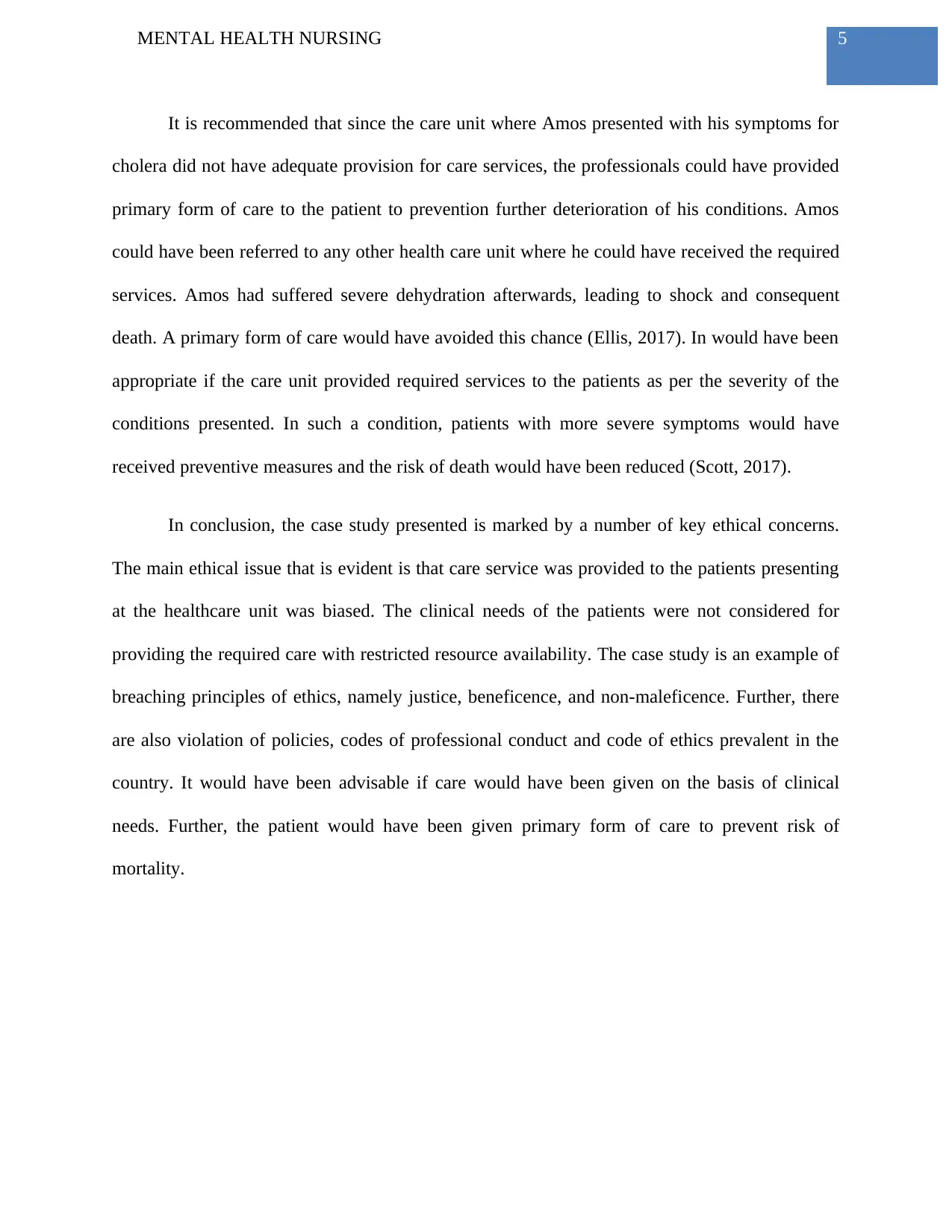
5MENTAL HEALTH NURSING
It is recommended that since the care unit where Amos presented with his symptoms for
cholera did not have adequate provision for care services, the professionals could have provided
primary form of care to the patient to prevention further deterioration of his conditions. Amos
could have been referred to any other health care unit where he could have received the required
services. Amos had suffered severe dehydration afterwards, leading to shock and consequent
death. A primary form of care would have avoided this chance (Ellis, 2017). In would have been
appropriate if the care unit provided required services to the patients as per the severity of the
conditions presented. In such a condition, patients with more severe symptoms would have
received preventive measures and the risk of death would have been reduced (Scott, 2017).
In conclusion, the case study presented is marked by a number of key ethical concerns.
The main ethical issue that is evident is that care service was provided to the patients presenting
at the healthcare unit was biased. The clinical needs of the patients were not considered for
providing the required care with restricted resource availability. The case study is an example of
breaching principles of ethics, namely justice, beneficence, and non-maleficence. Further, there
are also violation of policies, codes of professional conduct and code of ethics prevalent in the
country. It would have been advisable if care would have been given on the basis of clinical
needs. Further, the patient would have been given primary form of care to prevent risk of
mortality.
It is recommended that since the care unit where Amos presented with his symptoms for
cholera did not have adequate provision for care services, the professionals could have provided
primary form of care to the patient to prevention further deterioration of his conditions. Amos
could have been referred to any other health care unit where he could have received the required
services. Amos had suffered severe dehydration afterwards, leading to shock and consequent
death. A primary form of care would have avoided this chance (Ellis, 2017). In would have been
appropriate if the care unit provided required services to the patients as per the severity of the
conditions presented. In such a condition, patients with more severe symptoms would have
received preventive measures and the risk of death would have been reduced (Scott, 2017).
In conclusion, the case study presented is marked by a number of key ethical concerns.
The main ethical issue that is evident is that care service was provided to the patients presenting
at the healthcare unit was biased. The clinical needs of the patients were not considered for
providing the required care with restricted resource availability. The case study is an example of
breaching principles of ethics, namely justice, beneficence, and non-maleficence. Further, there
are also violation of policies, codes of professional conduct and code of ethics prevalent in the
country. It would have been advisable if care would have been given on the basis of clinical
needs. Further, the patient would have been given primary form of care to prevent risk of
mortality.
⊘ This is a preview!⊘
Do you want full access?
Subscribe today to unlock all pages.

Trusted by 1+ million students worldwide
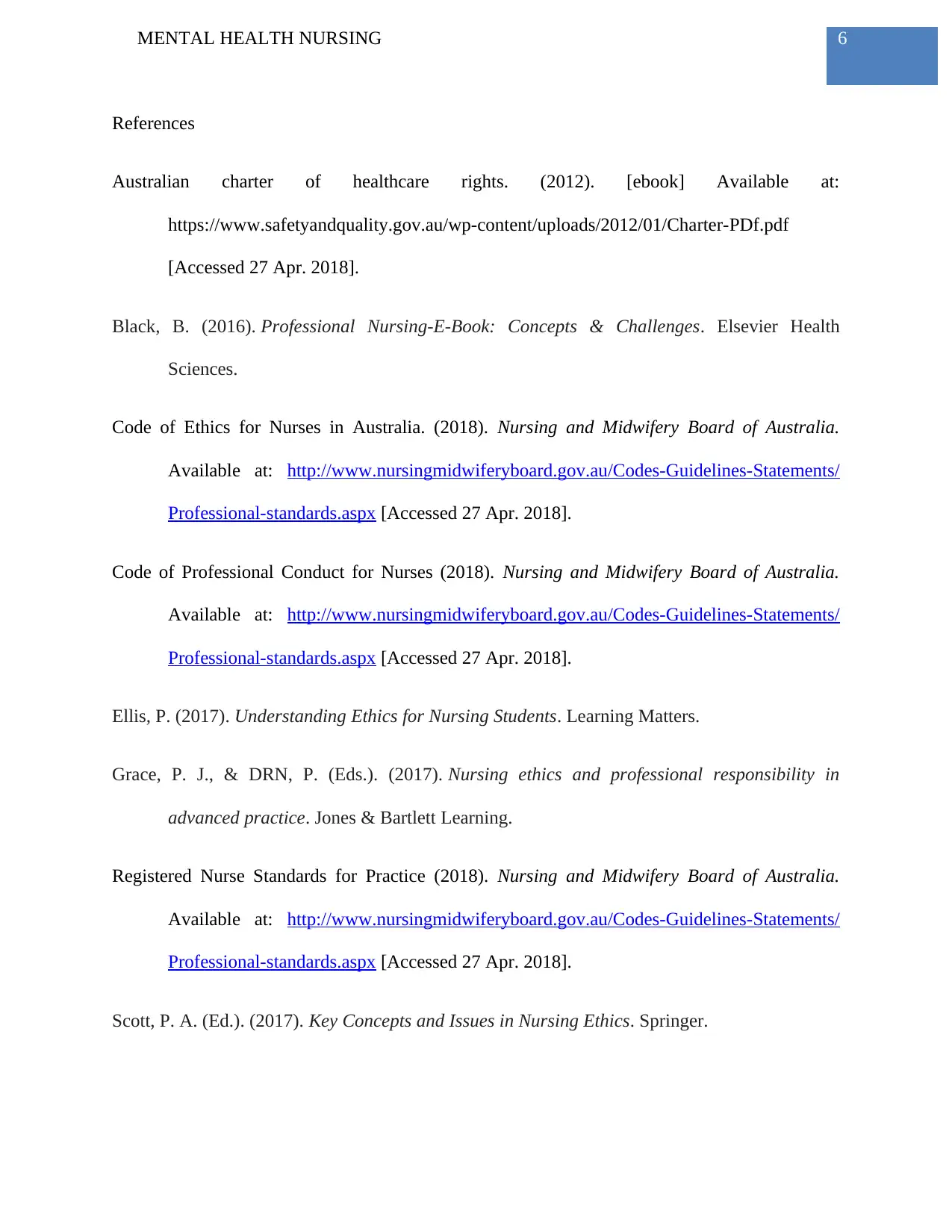
6MENTAL HEALTH NURSING
References
Australian charter of healthcare rights. (2012). [ebook] Available at:
https://www.safetyandquality.gov.au/wp-content/uploads/2012/01/Charter-PDf.pdf
[Accessed 27 Apr. 2018].
Black, B. (2016). Professional Nursing-E-Book: Concepts & Challenges. Elsevier Health
Sciences.
Code of Ethics for Nurses in Australia. (2018). Nursing and Midwifery Board of Australia.
Available at: http://www.nursingmidwiferyboard.gov.au/Codes-Guidelines-Statements/
Professional-standards.aspx [Accessed 27 Apr. 2018].
Code of Professional Conduct for Nurses (2018). Nursing and Midwifery Board of Australia.
Available at: http://www.nursingmidwiferyboard.gov.au/Codes-Guidelines-Statements/
Professional-standards.aspx [Accessed 27 Apr. 2018].
Ellis, P. (2017). Understanding Ethics for Nursing Students. Learning Matters.
Grace, P. J., & DRN, P. (Eds.). (2017). Nursing ethics and professional responsibility in
advanced practice. Jones & Bartlett Learning.
Registered Nurse Standards for Practice (2018). Nursing and Midwifery Board of Australia.
Available at: http://www.nursingmidwiferyboard.gov.au/Codes-Guidelines-Statements/
Professional-standards.aspx [Accessed 27 Apr. 2018].
Scott, P. A. (Ed.). (2017). Key Concepts and Issues in Nursing Ethics. Springer.
References
Australian charter of healthcare rights. (2012). [ebook] Available at:
https://www.safetyandquality.gov.au/wp-content/uploads/2012/01/Charter-PDf.pdf
[Accessed 27 Apr. 2018].
Black, B. (2016). Professional Nursing-E-Book: Concepts & Challenges. Elsevier Health
Sciences.
Code of Ethics for Nurses in Australia. (2018). Nursing and Midwifery Board of Australia.
Available at: http://www.nursingmidwiferyboard.gov.au/Codes-Guidelines-Statements/
Professional-standards.aspx [Accessed 27 Apr. 2018].
Code of Professional Conduct for Nurses (2018). Nursing and Midwifery Board of Australia.
Available at: http://www.nursingmidwiferyboard.gov.au/Codes-Guidelines-Statements/
Professional-standards.aspx [Accessed 27 Apr. 2018].
Ellis, P. (2017). Understanding Ethics for Nursing Students. Learning Matters.
Grace, P. J., & DRN, P. (Eds.). (2017). Nursing ethics and professional responsibility in
advanced practice. Jones & Bartlett Learning.
Registered Nurse Standards for Practice (2018). Nursing and Midwifery Board of Australia.
Available at: http://www.nursingmidwiferyboard.gov.au/Codes-Guidelines-Statements/
Professional-standards.aspx [Accessed 27 Apr. 2018].
Scott, P. A. (Ed.). (2017). Key Concepts and Issues in Nursing Ethics. Springer.
Paraphrase This Document
Need a fresh take? Get an instant paraphrase of this document with our AI Paraphraser
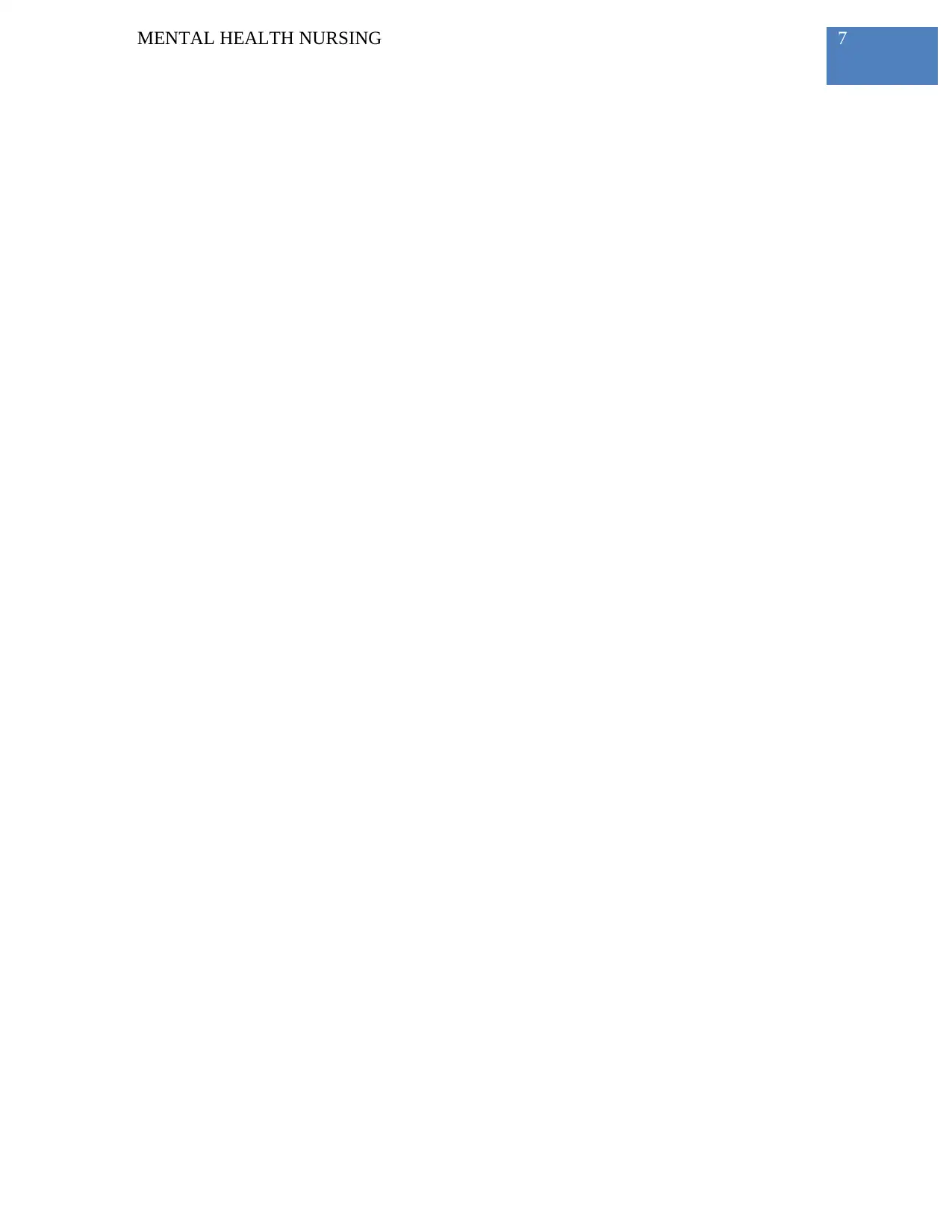
7MENTAL HEALTH NURSING
1 out of 8
Related Documents
Your All-in-One AI-Powered Toolkit for Academic Success.
+13062052269
info@desklib.com
Available 24*7 on WhatsApp / Email
![[object Object]](/_next/static/media/star-bottom.7253800d.svg)
Unlock your academic potential
Copyright © 2020–2026 A2Z Services. All Rights Reserved. Developed and managed by ZUCOL.





